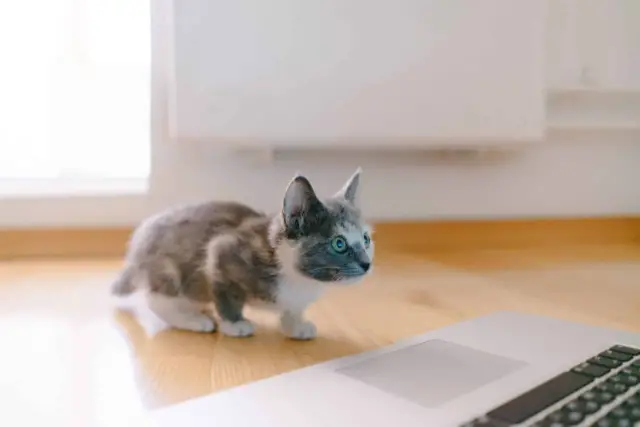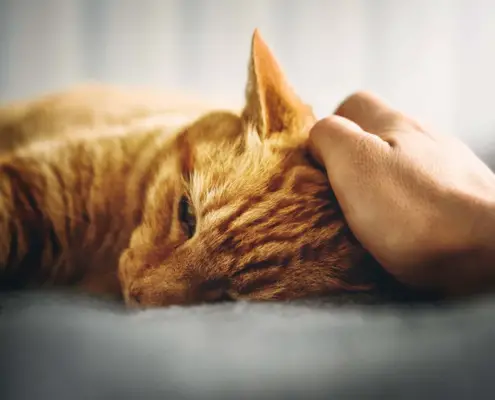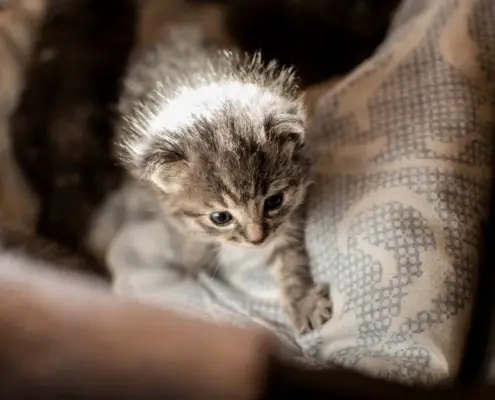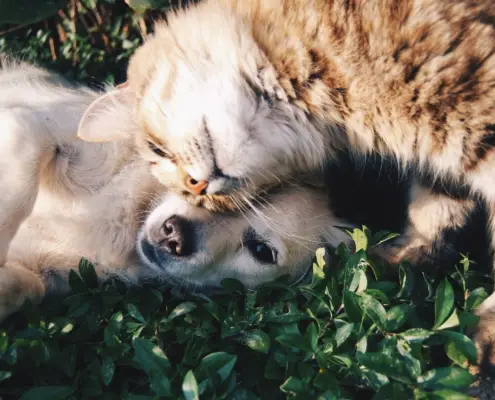
Regular veterinary visits are crucial for maintaining the optimal health and well-being of your feline companions. Cats, known for their independent nature, may not show obvious signs of illness or discomfort until the condition has progressed significantly. Routine check-ups with a veterinarian can help detect and prevent potential health issues, ensuring that your cat enjoys a long and healthy life.
During these visits, veterinarians conduct a thorough physical examination to assess your cat’s overall health. They check vital signs, inspect the teeth and gums, examine the eyes and ears, and palpate the abdomen for any abnormalities. Additionally, routine blood and urine tests may be performed to screen for underlying health conditions that may not be visible externally. By availing regular vet visits, you provide an opportunity for timely intervention and treatment, thereby preventing potential health complications.
Apart from physical health, veterinarians also assess your cat’s behavioral and emotional well-being during these visits. Cats are masters at disguising signs of stress or anxiety, and a veterinarian can provide you with guidance on how to create a stress-free environment for your feline friend. Overall, regular vet visits play a vital role in maintaining your cat’s health and happiness.
Factors to Consider When Determining How Often Cats Should See the Vet
The frequency of vet visits for cats depends on various factors such as age, overall health, lifestyle, and any pre-existing medical conditions. It is important to consult with your veterinarian to determine an appropriate schedule tailored to your cat’s specific needs. Here are some factors to consider when determining how often your cat should see the vet:
- Age: Kittens, adult cats, and senior cats have different healthcare requirements. Kittens require more frequent visits as they undergo vaccinations, deworming, and spaying/neutering procedures. Adult cats generally benefit from annual or bi-annual check-ups, while senior cats may require more frequent monitoring due to age-related health issues.
- Health: Cats with chronic illnesses or compromised immune systems may require more frequent visits to manage their condition effectively. Additionally, cats on long-term medications may need regular check-ups to monitor their response to treatment and adjust medication dosages if necessary.
- Lifestyle: Outdoor cats or cats exposed to other animals have a higher risk of contracting infectious diseases or parasites. In such cases, more frequent vet visits may be necessary to ensure early detection and prevention of these issues.
- Preventive Care: Regular vet visits allow for vaccinations, parasite prevention, and dental care, which are crucial for maintaining your cat’s overall health. Preventive care measures can help avoid costly and invasive treatments down the line.
By considering these factors, you can work with your veterinarian to establish an appropriate schedule that promotes your cat’s well-being and addresses their unique healthcare needs.
Kittens: When to Start Regular Vet Visits
Bringing a new kitten into your home is an exciting time, and it’s important to start their healthcare journey on the right foot. The first visit to the veterinarian should ideally occur within the first few weeks of acquiring your kitten. This initial visit is essential for several reasons:
- Vaccinations: Kittens require a series of vaccinations to protect them against common infectious diseases. During the first vet visit, your kitten will receive their first set of vaccinations, which typically include protection against feline viral rhinotracheitis, calicivirus, and panleukopenia. Additional vaccinations, including those for feline leukemia and rabies, may also be administered based on your kitten’s risk factors.
- Deworming: Kittens are often born with internal parasites or may acquire them through their environment. Routine deworming treatments help eliminate these parasites and prevent their recurrence, promoting the kitten’s overall health and growth.
- Spaying/Neutering: Your veterinarian will discuss the appropriate age for spaying or neutering your kitten. These procedures not only help control the cat population but also provide health benefits and reduce the risk of certain diseases later in life.
After the initial visit, your veterinarian will guide you on subsequent visits and establish a schedule for vaccinations, deworming, and other preventive care measures. Regular vet visits during the kitten stage lay the foundation for a healthy adulthood.
Adult Cats: How Often Should They See the Vet?
Once your cat reaches adulthood, routine vet visits are still essential for maintaining their health and well-being. Adult cats generally benefit from annual or bi-annual check-ups, depending on their individual needs. During these visits, your veterinarian will perform a comprehensive examination, update vaccinations if necessary, and conduct any required tests based on your cat’s health status.
Regular vet visits for adult cats also allow for preventive dental care. Dental issues are common in cats, and regular cleanings can help prevent periodontal disease, tooth loss, and other oral health problems. Your veterinarian will assess your cat’s dental health during these visits and recommend appropriate dental care measures.
Additionally, these visits provide an opportunity to discuss any changes in your cat’s behavior, eating habits, or litter box habits. Cats are masters at hiding discomfort, and subtle changes in behavior can be early indicators of underlying health issues. By addressing these concerns during vet visits, you can ensure early detection and prompt treatment.
Senior Cats: Special Considerations for Older Felines
As cats age, they become more susceptible to certain health conditions and may require more frequent vet visits. Senior cats, usually those aged seven years and older, benefit from semi-annual or even quarterly check-ups. These visits allow for close monitoring of their health and early intervention if any age-related issues arise.
During these visits, your veterinarian will perform a thorough physical examination, paying special attention to your cat’s joints, mobility, weight, and organ function. Blood and urine tests may be recommended to screen for age-related diseases such as kidney disease, diabetes, hyperthyroidism, or arthritis. Early detection of these conditions can significantly improve your cat’s quality of life and increase treatment success rates.
Furthermore, your veterinarian may suggest dietary modifications or supplements to support your senior cat’s changing nutritional needs. Regular vet visits for senior cats ensure that age-related health issues are proactively managed, allowing your feline companion to age gracefully and comfortably.
Signs That Your Cat May Need to See the Vet Sooner
While regular vet visits are important, there are instances when your cat may require immediate veterinary attention. Being aware of certain signs can help you identify when it’s time to consult a veterinarian sooner rather than later:
- Changes in Appetite: A sudden increase or decrease in appetite can indicate underlying health issues. If your cat stops eating or shows a significant change in eating habits, it’s essential to seek veterinary advice promptly.
- Weight Loss or Gain: Unexplained weight loss or weight gain can be indicative of various health conditions, including metabolic disorders, organ dysfunction, or digestive issues. A veterinarian can conduct the necessary tests to identify the underlying cause and recommend appropriate treatment.
- Lethargy or Behavioral Changes: If your cat becomes unusually lethargic, withdrawn, or displays sudden changes in behavior, it may be a sign of illness or pain. Consulting with a veterinarian can help determine the cause and initiate appropriate treatment.
- Vomiting or Diarrhea: Occasional vomiting or diarrhea may not be cause for concern, but frequent or persistent episodes can indicate underlying gastrointestinal issues that require veterinary attention.
- Breathing Difficulties: Labored or rapid breathing, coughing, or wheezing may indicate respiratory problems or heart conditions that require immediate medical attention.
- Visible Signs of Pain or Discomfort: Any signs of discomfort, such as limping, difficulty in movement, or excessive grooming of a particular area, should not be ignored. These signs may indicate injury, arthritis, or other painful conditions that require veterinary intervention.
If you observe any of these signs or notice anything unusual about your cat’s behavior or health, it is best to consult with your veterinarian promptly. Early detection and treatment can prevent the progression of potential health issues and ensure the well-being of your feline companion.
Tips for Making Vet Visits Less Stressful for Your Cat
Visiting the veterinarian can be stressful for cats, as they may associate it with discomfort or previous negative experiences. However, there are several strategies you can employ to make vet visits less stressful for your feline friend:
- Carrier Training: Introduce your cat to a carrier well in advance of the vet visit. Make it a positive experience by placing treats, toys, or soft bedding inside the carrier. Gradually increase the duration of time your cat spends in the carrier to ensure they feel comfortable and secure.
- Familiarize with Handling: Gently handle your cat’s paws, ears, and mouth at home to acclimate them to the sensations they may experience during a veterinary examination. Reward your cat with treats and praise to create positive associations.
- Scent Comfort: Bring a familiar blanket or toy with your cat’s scent to the vet visit. The familiar scent can provide a sense of comfort and security during the visit.
- Reduce Noise and Visual Stimuli: Cats are sensitive to noise and visual stimuli. Keep the carrier covered with a blanket to create a secure and calm environment during travel. Ask the veterinarian if there is a separate waiting area or quieter time slot available to minimize stress.
- Pheromone Sprays: Consider using synthetic pheromone sprays or wipes designed to reduce feline anxiety. These products release calming signals that can help soothe your cat during vet visits.
- Reward-Based Training: Reward your cat with treats and praise before, during, and after the vet visit to create positive associations. This can help alleviate anxiety and make future visits less stressful.
By implementing these strategies, you can make vet visits a more positive experience for your cat. Reducing stress not only benefits their emotional well-being but also allows the veterinarian to conduct a thorough examination without unnecessary distress.
The Cost of Regular Vet Visits for Cats
The cost of regular vet visits for cats can vary depending on several factors such as geographical location, the specific services provided, and the overall health of your cat. While veterinary fees may seem daunting, it is important to consider the long-term benefits and potential cost savings associated with preventive care.
Regular vet visits help detect and address health issues at an early stage, preventing them from escalating into more serious and expensive conditions. Additionally, preventive measures such as vaccinations, parasite control, and dental care can significantly reduce the risk of costly treatments in the future.
To manage the costs of regular vet visits, consider pet insurance plans that cover routine check-ups and preventive care. These plans can provide financial assistance and peace of mind, ensuring that your cat receives the necessary healthcare without straining your budget.
It is crucial to discuss the potential costs associated with regular vet visits with your veterinarian. They can provide an estimate of the expected expenses based on your cat’s individual needs and recommend cost-saving options without compromising the quality of care.
Common Misconceptions About Cat Health and Vet Visits
There are several misconceptions surrounding cat health and vet visits that can prevent cat owners from seeking appropriate veterinary care. It is important to debunk these myths to ensure the well-being of your feline companion:
- Cats are Self-Sufficient: While cats are known for their independent nature, they still require regular veterinary care. Cats are masters at hiding signs of illness, and delaying vet visits can result in a condition worsening before it is detected.
- Vaccinations are Unnecessary: Vaccinations are vital in preventing infectious diseases that can be life-threatening for cats. Regular vaccinations protect not only your cat but also other cats they may come into contact with.
- Cats Don’t Need Dental Care: Dental care is an essential part of maintaining a cat’s overall health. Poor dental hygiene can lead to periodontal disease, tooth loss, and other health issues. Regular dental cleanings can prevent discomfort and potential complications.
- Indoor Cats Don’t Need Vet Visits: Even if your cat is strictly indoors, they can still be exposed to certain health risks such as parasites, respiratory infections, or metabolic disorders. Regular vet visits are necessary to ensure their well-being.
- Cats Can “Wait it Out”: Delaying vet visits can be detrimental to your cat’s health. Cats are adept at hiding pain and discomfort, and by the time symptoms become evident, the condition may have progressed significantly. Early detection and treatment are key to successful outcomes.
By dispelling these misconceptions, you can prioritize your cat’s health and take the necessary steps to provide them with the best possible care.
Prioritizing Your Cat’s Health Through Regular Vet Visits
Regular vet visits are essential for maintaining your cat’s optimal health and well-being. By scheduling routine check-ups with a veterinarian, you can ensure early detection and prompt treatment of health issues, preventing them from escalating into more serious conditions. Factors such as age, overall health, and lifestyle play a role in determining the frequency of vet visits. Kittens, adult cats, and senior cats have different healthcare requirements, and it is crucial to consult with your veterinarian to establish an appropriate schedule.
Additionally, it is important to be aware of signs that may indicate your cat needs to see the vet sooner. Prompt veterinary attention can make a significant difference in the outcome of potential health issues. By making vet visits less stressful for your cat and debunking common misconceptions, you can prioritize their health and provide them with the care they deserve.
Remember, regular vet visits not only contribute to your cat’s physical health but also their emotional well-being. By investing in their healthcare, you are ensuring that your feline companion enjoys a long, happy, and healthy life.
If you enjoyed my article, I would appreciate you sharing it with your network.

Sima Ndlebe
Sima writes for CatBuzz. He is interested in Cats, Health and Fitness, and Entrepreneurship.
Published: 30 October 2023



